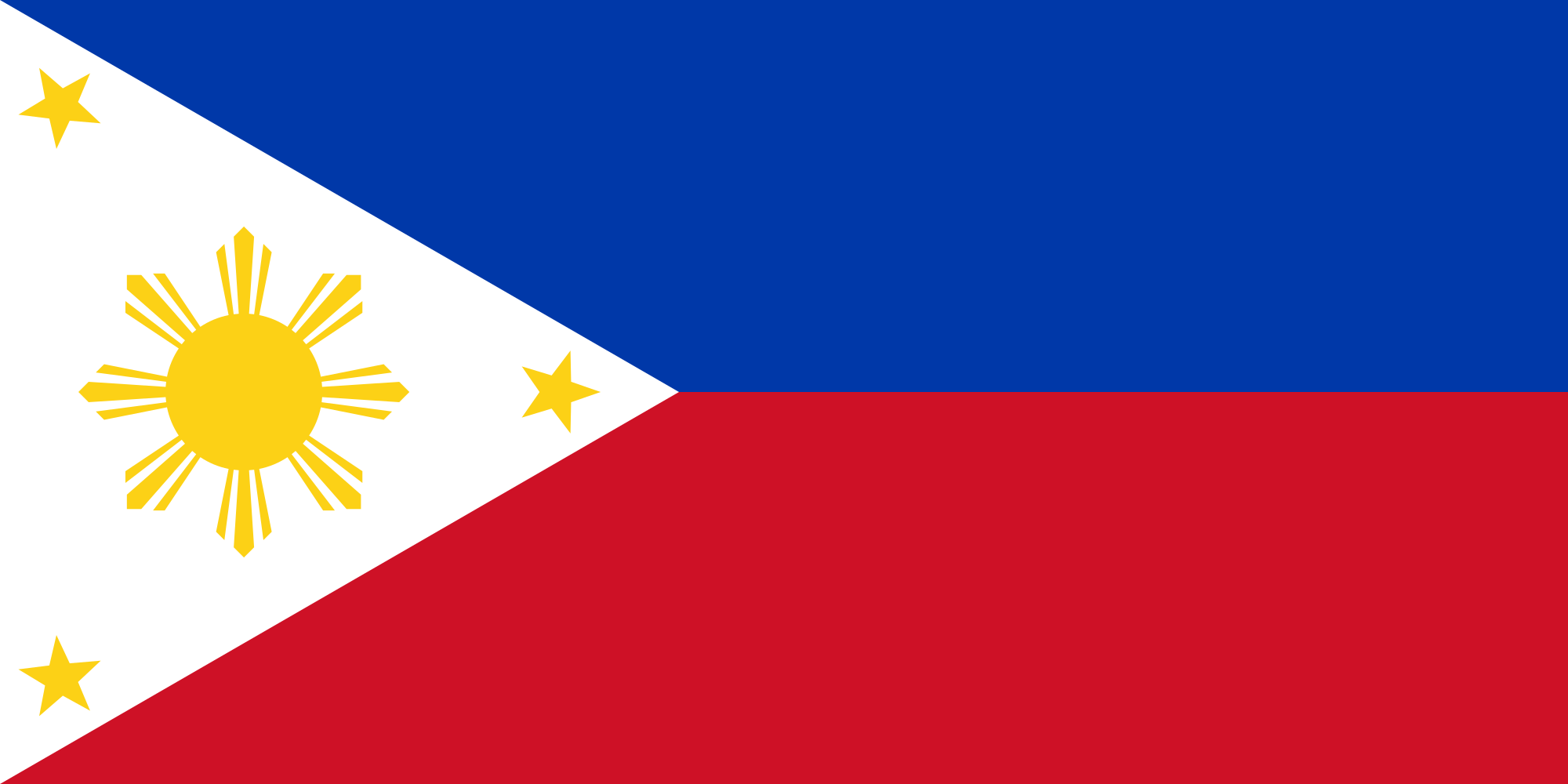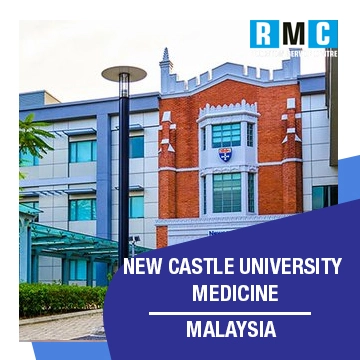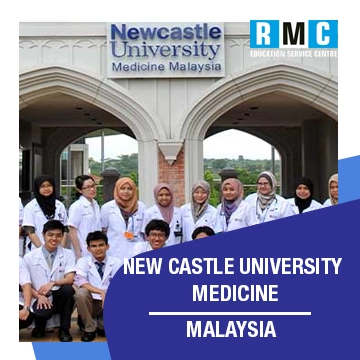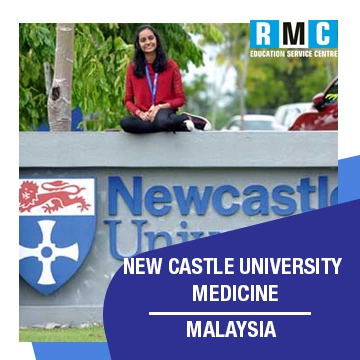New Castle University Medicine Malaysia
Newcastle University (legally the University of Newcastle upon Tyne) is a UK public research university based in Newcastle upon Tyne, North East England with overseas campuses in Singapore and Malaysia. The university is a red
brick university and a member of the Russell Group an association of research-intensive UK universities. It holds the Gold Award in the Teaching Excellence Framework (TEF), one of ten Russell Group universities to achieve the
Gold TEF rating. The university can trace its origins to a School of Medicine and Surgery (later the College of Medicine), established in 1834, and to the College of Physical Science (later renamed Armstrong College), founded
in 1871. These two colleges came to form one division of the federal University of Durham, with the Durham Colleges forming the other. The Newcastle colleges merged to form King's College in 1937. In 1963, following an Act
of Parliament, King's College became the University of Newcastle upon Tyne.
The university subdivides into three faculties: the Faculty of Humanities and Social Sciences; the Faculty of Medical Sciences; and the Faculty of Science, Agriculture and Engineering. The university offers around 175 full-time
undergraduate degree programmes in a wide range of subject areas spanning arts, sciences, engineering and medicine, together with approximately 340 postgraduate taught and research programmes across a range of disciplines The
annual income of the institution for 2017–18 was £495.7 million of which £109.4 million was from research grants and contracts, with an expenditure of £483.3 million Newcastle University currently has one of the largest EU
research portfolios in the UK.
The establishment of a university in Newcastle upon Tyne was first proposed in 1831 byThomas Greenhow in a lecture to the Literary and Philosophical Society. In 1832 a group of local medics – physicians George Fife (teaching materia
medica and therapeutics) and Samuel Knott (teaching theory and practice of medicine), and surgeons John Fife (teaching surgery), Alexander Fraser (teaching anatomy and physiology) and Henry Glassford Potter (teaching chemistry)
– started offering medical lectures in Bell's Court to supplement the apprenticeship system (a fourth surgeon, Duncan McAllum, is mentioned by some sources among the founders, but was not included in the prospectus). The first
session started on 1 October 1832 with eight or nine students, including John Snow, then apprenticed to a local surgeon-apothecary, the opening lecture being delivered by John Fife. In 1834 the lectures and practical demonstrations
moved to the Hall of the Company of Barber Surgeons to accommodate the growing number of students, and the School of Medicine and Surgery was formally established on 1 October 1834.
On 25 June 1851, following a dispute among the teaching staff, the school was formally dissolved and the lecturers split into two rival institutions. The majority formed the Newcastle College of Medicine, and the others established
themselves as the Newcastle upon Tyne College of Medicine and Practical Science. In July 1851 the majority college was recognised by the Society of Apothecariesand in October by the Royal College of Surgeons of England and
in January 1852 was approved by the University of London to submit its students for London medical degree examinations. Later in 1852, the majority college was formally linked to the University of Durham, becoming the "Newcastle-upon-Tyne
College of Medicine in connection with the University of Durham The college awarded its first 'Licence in Medicine' (LicMed) under the auspices of the University of Durham in 1856, with external examiners from Oxford and London,
becoming the first medical examining body on the United Kingdom to institute practical examinations alongside written and viva voce examinations. The two colleges amalgamated in 1857, with the first session of the unified college
opening on 3 October that year In 1861 the degree of Master of Surgery was introduced, allowing for the double qualification of Licence of Medicine and Bachelor of Surgery, along with the degrees of Bachelor of Medicine and
Doctor of Medicine, both of which required residence in Durham. In 1870 the college was brought into closer connection with the university, becoming the Durham University College of Medicine with the Reader in Medicine becoming
the Professor of Medicine, the college gaining a representative on the university's senate, and residence at the college henceforth counting as residence in the university towards degrees in medicine and surgery, removing the
need for students to spend a period of residence in Durham before they could receive the higher degrees
About Country, Malaysia
Malaysia is a country in Southeast Asia. The federal constitutional monarchy consists of thirteen states and three federal territories, separated by the South China Sea into two regions, Peninsular Malaysia and Borneo's East Malaysia.
Peninsular Malaysia shares a land and maritime border with Thailand and maritime borders with Singapore, Vietnam, and Indonesia. East Malaysia shares land and maritime borders with Brunei and Indonesia and a maritime border
with the Philippines and Vietnam. Kuala Lumpuris the national capital and largest city while Putrajaya is the seat of the federal government. With a population of over 32million, Malaysia is the world's 43rd-most populous
country. The southernmost point of continental Eurasia is in Tanjung Piai. In the tropics, Malaysia is one of 17 megadiverse countries, home to a number of endemic species. Malaysia has its origins in the Malay kingdoms which,
from the 18th century, became subject to the British Empire, along with the British Straits Settlements protectorate. Peninsular Malaysia was unified as the Malayan Union in 1946. Malaya was restructured as the Federation of
Malaya in 1948 and achieved independence on 31 August 1957. Malaya united with North Borneo, Sarawak, and Singapore on 16 September 1963 to become Malaysia. In 1965, Singapore was expelledfrom the federation
The country is multi-ethnic and multi-cultural, which has a significant effect on its politics. About half the population is ethnicallyMalay, with minorities of Chinese, Indians, and indigenous peoples. The country's official
language is Malaysian, a standard form of the Malay language. English remains an active second language. While recognising Islamas the country's established religion, the constitution grants freedom of religion to non-Muslims.
The government is modelled on the Westminster parliamentary system and the legal system is based on common law. The is an elected monarch, chosen from among the nine state sultansevery five years. The head of government is
the Prime Minister.
After independence, the Malaysian GDP grew at an average of 6.5% per annum for almost 50 years. The economy has traditionally been fuelled by its natural resources but is expanding in the sectors of science, tourism, commerce and medical
tourism. Malaysia has a newly industrialised market economy, ranked third-largest in Southeast Asia and 33rd-largest in the world It is a founding member of ASEAN, EAS, OIC and a member of APEC, the Commonwealth and the Non-Aligned
Movement.
Malaysia has a multi-ethnic, multicultural, and multilingual society. The original culture of the area stemmed from indigenous tribes that inhabited it, along with the Malays who later moved there. Substantial influence exists
from Chinese and Indian culture, dating back to when foreign trade began. Other cultural influences include the Persian, Arabic, and British cultures. Due to the structure of the government, coupled with the social contract theory,
there has been minimal cultural assimilation of ethnic minorities
In 1971, the government created a "National Cultural Policy", defining Malaysian culture. It stated that Malaysian culture must be based on the culture of the indigenous peoples of Malaysia, that it may incorporate suitable elements
from other cultures, and that Islam must play a part in it It also promoted the Malay language above others This government intervention into culture has caused resentment among non-Malays who feel their cultural freedom was
lessened. Both Chinese and Indian associations have submitted memorandums to the government, accusing it of formulating an undemocratic culture policy.
Some cultural disputes exist between Malaysia and neighbouring countries, notably Indonesia. The two countries have a similar cultural heritage, sharing many traditions and items. However, disputes have arisen over things ranging
from culinary dishes to Malaysia's national anthem. Strong feelings exist in Indonesia about protecting their national heritage The Malaysian government and the Indonesian government have met to defuse some of the tensions
resulting from the overlaps in cultureFeelings are not as strong in Malaysia, where most recognise that many cultural values are shared.
New Castle University Medicine Malaysia Fees Structure 2023-24
Newcastle University Medicine Malaysia Requirements
To enter NUMed Malaysia, you must satisfy the academic, English language and age requirements of the University set out below.
Selection will be based on a combination of:
- your pre-university examination results (or forecast results)
- proficiency in English
- your performance in the Medical Student Interview (MB BS programme only)
Age requirements
For the MBBS Honours and BSc (Honours) Biomedical Sciences programmes you should be at least 18 years of age at the time of enrolment.
For the Foundation Certificate in Biological and Biomedical Sciences programme you should be at least 16 years of age at the time of enrolment.
International Students
While the Newcastle University medical and biomedical degrees offered at NUMed Malaysia are principally to cater for the Malaysian market, applications from non-Malaysian citizens are welcomed.
For the MBBS and Biomedical Sciences programme, additional compulsory Bahasa Melayu language provision is provided.
MB BS places are not available at NUMed Malaysia for citizens of the UK or from countries of the EC. Such applicants should apply through the UK UCAS system for a place at our UK campus.
It is a requirement that all international students receive approval from the Malaysian Immigration Department and a Student Pass. Application for a Student Pass will be managed by NUMed Malaysia. It is the prerogative of the Malaysian
Immigration Department and the Ministry of Higher Education to approve or reject any visa application.
Special considerations
Any statement regarding circumstances which may have seriously impaired your studies in the final year of your pre-university education that you may wish to put forward for special consideration must be submitted at the time of
application. NUMed Malaysia will not give special consideration to such statements made at a later time.
New Castle University Medicine Malaysia Ranking 2023-24
Newcastle is a Russell Group University that consistently ranks in the top 20 in the UK for research power and student experience. Our position in the global rankings.
New Castle University Medicine Malaysia Accommodation
The new accommodation is just a 5-minute drive from the campus, with free, regular transport provided. We provide transport not only between the accommodation and the campus, but also between the accommodation and the nearby facilities,
including eateries, shopping centres, entertainment outlets and other recreational attractions.
New Castle University Medicine Malaysia Facilities
We offer high-quality self-catering apartments, arranged as a number of study-bedrooms sharing a central kitchen/living room and shower facilities.
The air-conditioned apartments also have wireless Internet access. There is a swimming pool and gymnasium on-site, to which all students staying in the accommodation have free access.
Each apartment is self-catering and is equipped with its own fridge, cooker and washing machine.
Students are responsible for taking care of their own unit.
Each apartment houses from four to six students.
Transport
Bukit Indah is just a ten-minute drive from the accommodation. There is a free shuttle bus service between the accommodation and AEON Jusco, Bukit Indah.
The shuttle service operates from 07.00 – 22.00, seven days a week with a reduced service on Saturdays, Sundays and Public Holidays throughout the academic year. It is a continuous service.
Newcastle university medicine Malaysia library
Newcastle university medicine Malaysia library offers borrowing facilities and a range of service for all the member of service. E-books are also available. A library is a curated collection of sources of information and similar
resources, selected by experts and made accessible to a defined community for reference or borrowing, often in a quiet environment conducive to study. It provides physical or digital access to material, and may be a physical
location or a virtual space, or both.
Frequently Asked Questions
Is Newcastle University good for medicine?
Quality and ranking Medicine at Newcastle is consistently one of the most highly regarded medical programmes in the UK. The excellence of our programmes has been confirmed by the General Medical Council (GMC). We are
ranked: top 10 in the UK – The Times/Sunday Times Good University Guide 2020.
Is it good to study MBBS in Malaysia?
Reasons to study MBBS in Malaysia for International Students With 95% literacy rate, Malaysia is globally known for its quality and cost of MBBS in Malaysia. Most medical colleges in Malaysia are recognised by MCI,
WHO, FAIMER and UNESCO.
What is the rank of Newcastle University?
152nd
Currently, Newcastle University is ranked: =152nd in the QS World Ranking published 2020. 78th in the Leiden Ranking 2020. 23rd in the Times Higher Education Europe Teaching Rankings published 2019.
 New Castle University Medicine Malaysia
New Castle University Medicine Malaysia





